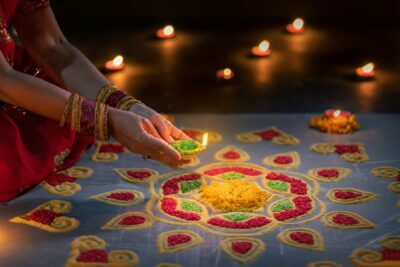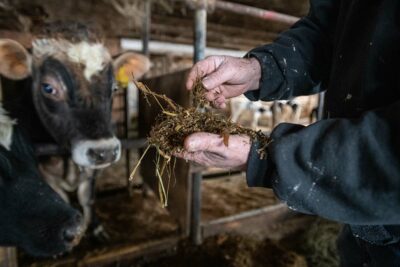Among the many festivals celebrated by Indians, Diwali is probably the most prominent. Homes and streets are adorned with sparkling lights and families gather together to give thanks for all they have received. But a huge aspect of Diwali is the indulgence in a variety of sweets and savories laden with ghee, butter, cream, and the works. So where does that leave a vegan who doesn’t eat anything that comes from an animal?
Diwali, a Dairy-Filled Extravaganza
Diwali holds a special place in the hearts of millions, both in India and amongst the Indian diaspora worldwide. Marked by vibrant decorations and a sense of togetherness, it symbolizes the victory of light over darkness and the triumph of good over evil.
Celebrated over five days, each day of Diwali represents different rituals and traditions. Diyas (oil lamps), lanterns and colorful rangoli (decorative patterns made of colored powders or rice flour) adorn homes and offices, and presents are exchanged with friends and family.
But the most anticipated aspect of Diwali is the food that comes with it. And since dairy is considered to be part of the traditional food system in India, it sees a resurgence around festivals like these because of its use in rituals and ritualistic recipes. This is mainly because the milk from a cow, the ever-giving mother, has been given the status of a ‘pure’ food with purifying qualities.
Food is an important part of every Indian festival and Diwali is right at the top. Extravagance is key here and this dairy-loving population adds excessive amounts of milk and milk products into celebratory foods. This is also the time that most food businesses especially those making sweets, both traditional and otherwise, devise special Diwali menus filled with copious amounts of sugar with ghee, cream, or butter made from cows’ and buffaloes’ milk.

Fear Not Fellow Vegans
Many people willingly throw their dietary considerations out the window during Diwali. It is hard to stay with any diet when you are surrounded by mountains of nostalgic gulab jamun or fancy mithais with caramel centers like you’ve never seen before.
But for vegans whose ethical conscience is paramount, there are ways to overcome and maybe even plant a seed to foster kindness and compassion.
Vegan Tips for Diwali
1. Take your own vegan sweets
This is by far the best strategy to follow for any festive or religious occasion. If you can make something or if you have the opportunity to buy something vegan, bring it along. It is always seen as a kind, generous gesture. This is also a great way to show people that veganizing traditional recipes can have equally delicious results.
Ready-to-use vegan alternatives aside, replacing dairy-based ingredients in traditional recipes is quite straightforward. Any one of the plant-based oils can be used to replace ghee or butter. Dairy-based cream and milk can be substituted with cashew or almond paste. If you want to keep it simple, using flour or nuts together with dates works as a modest laddoo.
2. Eat before you meet
A smart thing to do is to never go to a gathering on an empty stomach. If you have the time to prepare something, it’s better to eat before you go to a celebration because you never know if there’s going to be anything vegan available.
3. Saying ‘no’ is okay
Festivals sometimes become uncomfortable areas to refuse sweets, especially prasad (a devotional offering), but it’s okay to do so. If you absolutely cannot say no, take a piece and hand it over to someone who eats it. Some people even say they are fasting to avoid taking something they cannot eat and this is acceptable too.
4. Speak up
In order to avoid causing inconvenience to the host, people (vegans included) often prefer to not mention that they do not eat certain foods. But that needs to change. Inform your hosts, even if they are your family, that you cannot eat certain foods and offer to bring food along for yourself. We live in times where many people have dietary restrictions and most people look at veganism as one of them (even though we know it is not a restriction).
5. Push the boundaries beyond food
Whether it’s opting for sustainable and cruelty-free attire or refraining from participating in fireworks that might include animal ingredients or harm animals, there are numerous facets of a vegan lifestyle that can be embraced during Diwali. Opting to give gifts that are cruelty-free also sends a powerful message.
6. Be vegan and proud
There’s a joke that often goes around saying you’d know someone is vegan because they would mention it within the first five minutes of meeting you. We think that’s great! Most people have misconceptions about veganism and are open to learning more. Don’t hesitate to speak about your choices, you never know maybe you could inspire someone to make the shift.

There couldn’t be a more apt festival that one could associate veganism with.
After all, Diwali signifies the victory of good over evil, knowledge over ignorance, and light over darkness. As vegans, that’s all most of us want to see: a kinder, more compassionate world where all of the virtues Diwali stands for are put into action.




